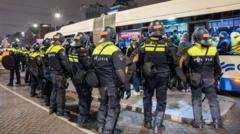Recent convictions bring attention to rising tensions in Amsterdam, prompted by football-related violence and the broader political context of the Israel-Palestine conflict.
**Jail Sentences for Amsterdam Rioters Highlight Social and Political Tensions**

**Jail Sentences for Amsterdam Rioters Highlight Social and Political Tensions**
Dutch court sentences four involved in post-football match violence; antisemitism concerns arise amid societal unrest.
In early November, just after a Europa League match between Ajax and Israeli club Maccabi Tel Aviv, violence erupted in Amsterdam, resulting in four individuals receiving jail sentences. The court's decision was informed by the seriousness of the attacks, which targeted Maccabi fans during what has been described as "hit-and-run" incidents. The most severe sentence was given to 32-year-old Sefa Ö, who will serve six months in prison for his leading role in the violence, including physically assaulting victims.
The judges considered the extensive video evidence documenting the violent encounters. Footage showed assaults at various locations, including Dam Square and Damrak, which led to significant international condemnation. The escalation of violence aligns with broader tensions in Dutch society, particularly connected to the ongoing Israel-Palestine conflict, as the court noted prior unrest in the Netherlands related to the situation in Gaza.
All four sentenced individuals were part of a WhatsApp group that circulated violent intentions against individuals seen as supporters of Maccabi Tel Aviv and Jewish descent. This controversial aspect of the case has raised alarms about antisemitism in the region, prompting discussions about community safety and the impact of such violence on minority groups. Rachid O, another convicted individual, was found to have made derogatory comments about Jewish people in the same chat group.
A fifth defendant, Lucas D, who was only 19, was charged for using violence against law enforcement and allegedly possessing a high-explosive firework when arrested. His case, along with the others, raises questions about youth involvement in politically charged violence.
While the chief prosecutor acknowledged the rise of antisemitism indicated by the messaging exchanges, he distanced the group's actions from terrorism, asserting that their goal was not fear but physical confrontation. This distinction has fueled ongoing debates about the nature of violence in the context of political tensions, indicating a complex intersection of societal fears, prejudice, and the implications of broader geopolitical conflicts.
The rulings made by the Dutch court serve as a crucial reminder of the delicate nature of social relations in Amsterdam and highlight the repercussions of violence fueled by political disagreements. As society grapples with these issues, observers will undoubtedly keep a close watch on how these developments may influence community dynamics and relationships between different cultural groups in the Netherlands.
The judges considered the extensive video evidence documenting the violent encounters. Footage showed assaults at various locations, including Dam Square and Damrak, which led to significant international condemnation. The escalation of violence aligns with broader tensions in Dutch society, particularly connected to the ongoing Israel-Palestine conflict, as the court noted prior unrest in the Netherlands related to the situation in Gaza.
All four sentenced individuals were part of a WhatsApp group that circulated violent intentions against individuals seen as supporters of Maccabi Tel Aviv and Jewish descent. This controversial aspect of the case has raised alarms about antisemitism in the region, prompting discussions about community safety and the impact of such violence on minority groups. Rachid O, another convicted individual, was found to have made derogatory comments about Jewish people in the same chat group.
A fifth defendant, Lucas D, who was only 19, was charged for using violence against law enforcement and allegedly possessing a high-explosive firework when arrested. His case, along with the others, raises questions about youth involvement in politically charged violence.
While the chief prosecutor acknowledged the rise of antisemitism indicated by the messaging exchanges, he distanced the group's actions from terrorism, asserting that their goal was not fear but physical confrontation. This distinction has fueled ongoing debates about the nature of violence in the context of political tensions, indicating a complex intersection of societal fears, prejudice, and the implications of broader geopolitical conflicts.
The rulings made by the Dutch court serve as a crucial reminder of the delicate nature of social relations in Amsterdam and highlight the repercussions of violence fueled by political disagreements. As society grapples with these issues, observers will undoubtedly keep a close watch on how these developments may influence community dynamics and relationships between different cultural groups in the Netherlands.


















